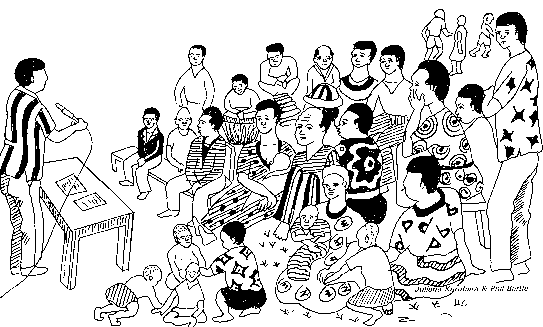Tweet
Translations:
Català
中文 / Zhōngwén
English
Español
Filipino/Tagalog
Français
Ελληνικά / Elliniká
Italiano
Português
Română
Српски / Srpski
Türkçe
Other formats:
Other Pages:
Modules
Site Map
Key Words
Contact
Utility Documents
Useful Links
POLITICIANS AND WATER
Wary Allies or Dangerous Adversaries
by Phil Bartle, PhD
Dedicated to Andrew Livingstone
Training Handout
Mobilizers Must Understand Politicians
The Desires of Politicians:
Politicians can be dangerous to mobilizers. At best they can be wary allies. At worst, politicians can undo most of the empowerment work of mobilizers. Why?
The main purpose, desire and goal of an elected politician is to get re-elected, and/or elected to higher office. The main purpose of an un-elected politician (officials in the civil service and those appointed by higher governments), is to (a) stay employed, and (2) obtain higher office. The politician does not want to empower a community unless and only if that will help her or him reach her or his primary goals.
If the main perception of the population is that water was free, and should be provided for free by the government, then it does not serve the purpose of a politician to say that water is not free. (In truth, water is not free). That will not be music to the ears of the people. To get elected, or to get a promotion, a politician is easily tempted to make promises to the people. Promises encourage dependency thinking. Bringing free water is an easy promise for the politician to make.
If there is genuine mobilization for empowerment in the area, no matter who is doing the mobilization, the politician is tempted to say that it will bring water for free, and allow the mobilizer to try to contradict that. Bringing the water for free, by any agency, will increase dependency, perpetuate the myth that water is free, and therefore increase poverty rather than counteract it. If water does not come, the politician can blame the mobilizer. If a mobilizer is too public in stating these facts, she or he may find his credentials and licence permission to operate removed by the politician who does not want those facts to be too public. The first casualty of politics (as in war) is truth.
The only strategy the mobilizer can undertake is to demonstrate that if the empowerment approach is allowed to grow, the people will become more informed, economically better off, and more empowered. If they then see that the politician assisted in that process (rather than told lies to subvert it), the politician will benefit.
If the politician, in her or his efforts to get re-elected or promoted, explains that while water is not free, it is an investment and that communities can become stronger if they make more effort, then the politician can be an ally. Short sighted and dishonest politicians need not apply. Politicians who put the welfare of the community ahead of their own aspirations are welcome.
––»«––
A Politician:
 |